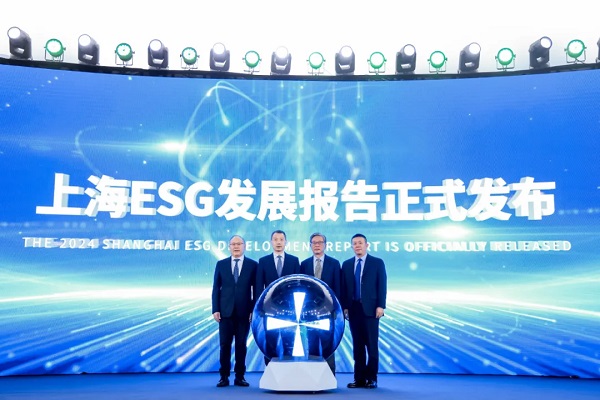The Shanghai Advanced Institute of Finance (SAIF) at Shanghai Jiao Tong University has taken the lead in releasing the "Practicing Sustainable Development - 2024 Shanghai ESG Development Report" (the Report) at the 4th ESG Global Leaders Conference. The conference, themed "Promoting Global ESG Cooperation, Development and Win-Win," was held from October 16th to 18th in Shanghai's Huangpu District, co-hosted by CITIC Group and Sina Group, and organized by Sina Finance and CITIC Publishing Group.

The Report, the first systematic review of local ESG development in China, was compiled by SAIF in collaboration with multiple enterprises and organizations. Led by Guangshao Tu, Founding Chair of the Board at SAIF; and Hong Yan, Chair Professor of Finance, Deputy Dean of Academic Affairs and Faculty, and Director of SAIF Sustainable Investment Research Center; the working group comprised participants from prominent institutions and companies in Shanghai.
The Report systematically outlines ESG development in Shanghai, summarizing achievements, challenges, and future strategies—contributing "Shanghai wisdom" to national and global sustainable development. As global climate issues intensify and social responsibility demands rise, the pursuit of economic benefits while fostering ESG harmony has become a key international concern. Shanghai, a leader in China's economy and a global financial hub, is at the forefront of domestic ESG trends and holds a significant position in global ESG development.
The Report highlights Shanghai's pioneering role in China's ESG development, responding to the national "Carbon Peaking and Carbon Neutrality Goals" strategy and innovating ESG-related policies. Shanghai has made significant advancements in ESG disclosure, index compilation, and institutionalization—setting benchmarks for other regions. The Report also analyzes the roles of various stakeholders in Shanghai's ESG ecosystem, including: listed companies, financial institutions, trading platforms, professional service organizations, government, industry organizations, educational institutions, media, and the public.
The Report suggests that Shanghai should focus on four aspects of ESG construction: internalization of ESG business activities, standardization of ESG information disclosure, systematization of ESG evaluation systems, and concretization of ESG value realization. These aspects are crucial for Shanghai's sustainable development and global ESG progress.
As an international finance-focused institute, SAIF has been promoting ESG concepts and talent training for 15 years since its inception, continuously contributing to the ESG field. SAIF scholars have achieved notable academic research results with over 1,200 citations. The institute provides high-level research reports and policy recommendations, including the 2024 Shanghai ESG Development Report and the Shanghai Green Finance Index. SAIF has also introduced a sustainable finance curriculum aligned with the Sustainable Development Goals (SDGs), aiming to nurture talent for national green strategies. Additionally, SAIF has established the SAIF Sustainable Investment Research Center and organized forums to advance sustainable investment and socio-economic development.






